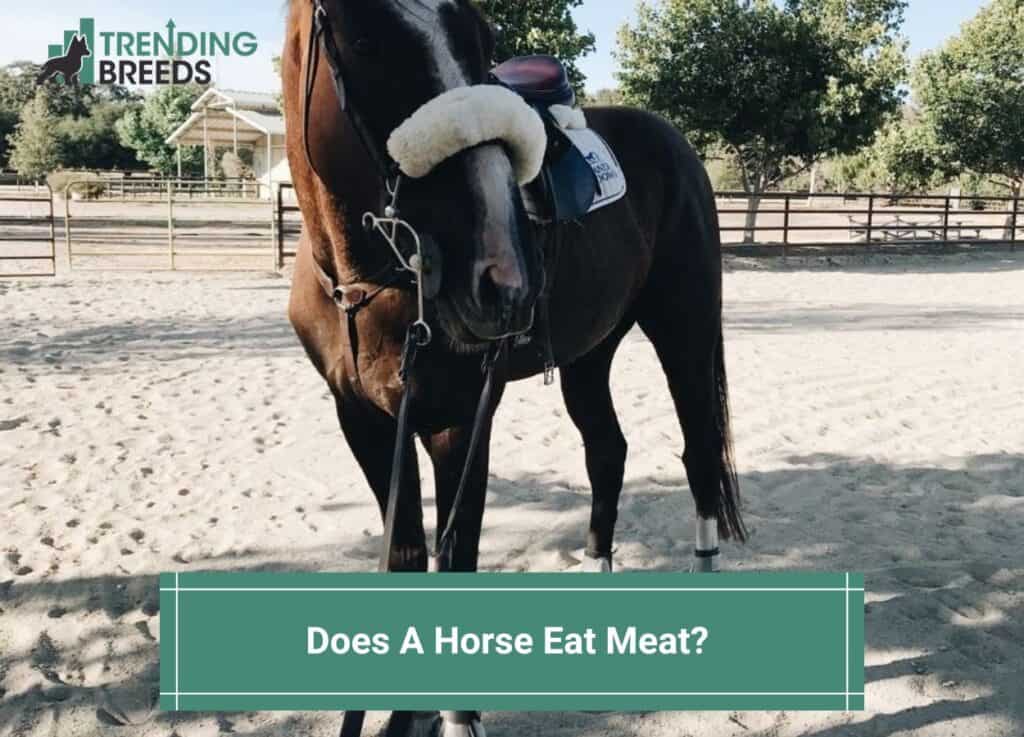No, horses cannot eat meat as their digestive systems are not designed to process it. Horses are herbivores by nature and have evolved to consume mainly grasses, hay, and grains.
Their digestive system is optimized to break down complex carbohydrates found in plant material, and they rely on bacteria in their gut to ferment and digest these types of foods. Meat, on the other hand, is rich in protein and fats, which are difficult for horses to digest and can lead to health issues such as colic or gastrointestinal upset.
It is important to provide horses with a well-balanced diet that meets their nutritional needs and avoids any potentially harmful foods.
Can Horses Digest Meat?
Horses are natural herbivores with unique digestive systems, which limits their ability to digest and process meat effectively. Their digestive tracts are designed to efficiently process a diet rich in fiber and plant matter. While horses may accidentally consume small amounts of meat, their bodies are not adapted to fully break it down and extract the necessary nutrients.
Unlike carnivores or omnivores, horses lack the necessary enzymes and stomach acidity to effectively digest meat. Therefore, it is important to provide horses with a diet that primarily consists of high-quality forage, such as hay or grass, along with appropriate supplementation to meet their nutritional needs.
Ensuring a balanced diet that is rich in fiber and plant matter is essential for maintaining the health and well-being of horses.
The Risks Of Feeding Horses Meat
Feeding horses meat poses potential health issues and complications, especially negative effects on their digestive system. The risk of colic and other gastrointestinal problems significantly increases as well. Additionally, the equine digestive system is not designed to process meat, making it difficult for horses to digest and absorb the necessary nutrients.
Moreover, introducing meat into their diet can disrupt the balance of their gut flora, leading to further digestive issues. In this article, we explore why it is not recommended to feed horses meat and the potential risks it can pose to their overall health.
Horse owners should prioritize a balanced diet consisting primarily of hay, grass, and quality horse feed that meets their nutritional requirements. Keeping their diet consistent and appropriate is essential for maintaining a horse’s optimal health and well-being.
Instances Of Horses Eating Meat
Instances of horses eating meat are rare and considered abnormal behaviors. There have been reported cases of horses consuming small animals and birds. While such incidents are uncommon, they do happen occasionally. Scientists and experts have suggested various possible reasons behind this behavior.
Some attribute it to nutritional deficiencies in the horse’s diet, while others believe it could be a result of curiosity or stress. It’s important to note that horses are herbivores by nature, and their digestive system is specifically designed for processing plant-based foods.
Feeding horses a balanced diet consisting of grass, hay, and appropriate supplements is crucial for their overall health and well-being. Further studies are needed to fully understand the underlying factors that may lead to horses occasionally exhibiting carnivorous behavior.
Understanding The Nutritional Needs Of Horses
Horses are herbivores, and their nutritional needs are primarily met through a plant-based diet. Fiber and carbohydrates play an essential role in their digestive system to maintain proper gut health and facilitate digestion. Horses also require a balanced mix of vitamins and minerals to support their overall well-being.
It is important for horse owners to ensure that their animals receive a proper balance of nutrients to prevent any deficiencies or imbalances. While horses are not designed to consume meat and have no physiological need for it, it is crucial to provide them with a well-rounded diet that meets their specific dietary requirements.
By understanding the nutritional needs of horses and providing them with the necessary nutrients, horse owners can help ensure their animals’ optimal health and performance.
Alternatives To Feeding Meat To Horses
Can horses eat meat? When it comes to meeting their nutritional needs, feeding strategies should focus on high-quality forage, grains, and supplements. Additionally, consulting with a veterinarian or equine nutritionist is crucial. Feeding horses with high-quality forage such as hay or pasture is important for their digestive health.
Grains can be added to provide additional energy and nutrients. Supplements can also play a role in balancing their diet, especially if the forage lacks certain nutrients. However, it is essential to consult with a professional to ensure the right amounts and types of feed.
While some animals are omnivores, horses are herbivores, and their digestive system is designed to process plant-based foods. Feeding them a meat-based diet can lead to serious health issues and digestive problems. So, it is best to stick to their natural diet to keep them healthy and thriving.

Credit: www.trendingbreeds.com
Conclusion
While horses are natural herbivores, the question of whether they can eat meat is still highly debated among experts. Scientifically speaking, horses have evolved to process and derive nutrients from a plant-based diet, making it their ideal food source. However, there have been isolated cases where horses have shown signs of curiosity towards meat or accidentally ingested small amounts without suffering any immediate harm.
Nonetheless, these instances are considered rare and out of the ordinary. It is crucial for horse owners and caretakers to prioritize their animal’s well-being and stick to a balanced diet that consists of high-quality hay, pasture, grains, and supplements specifically formulated for horses.
Remember, a horse’s digestive system is sensitive and not adapted to digest meat properly, so it’s best to play it safe and avoid feeding horses any form of meat. As responsible horse owners, it is our duty to prioritize their health and provide them with the appropriate nutrition they require to thrive.
